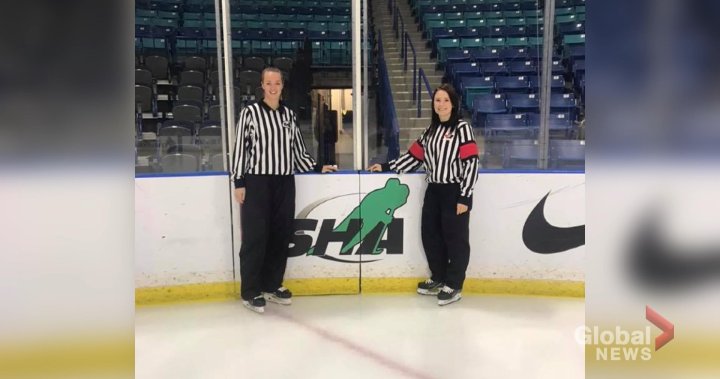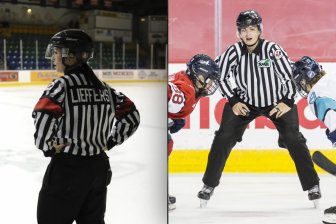“It was honestly a mix of emotions,” Olympic referee Cianna Lieffers admitted.
After years of donning the black and white-striped jersey of an on-ice official, the Cudsworth, Sask., native had finally reached her ultimate goal: officiating at the Olympic Winter Games.
“There was excitement, there was tears, there was relief after waiting those two weeks, there was a huge sense of pride,” she said.
However, her journey to the 2022 Olympics in Beijing began many years ago at the Cudsworth Arena, when she was just refereeing as a high school job.
“When I was in high school I only worked local minor hockey out of our small town and my Friday night routine was always to ref the game before the one that I played in,” Lieffers said.
“One Friday there was a ref from (Prince Albert) who came early to ref the game I was playing in that night, he really took note because it wasn’t common to have a female referee in such a small area. After seeing me ref and then play, seeing that I could skate and I understood the game, he put my name forward for officiating P.A. minor hockey.”
“Never in my life when I first started in my first couple of years of refereeing would I be thinking that I would ever have the privilege to be on the ice at a Four Nations Cup, or at the Women’s World Championship and soon the Olympic Winter Games,” she added.
Joining Lieffers in Beijing will be long-time friend and linesperson Alex Clarke.
Just like Lieffers, Clarke began her on-ice officiating at a young age, but the native of Drake, Sask.’s journey to the Olympics took a different path.
Clarke played four years at the College of St. Scholastica in the NCAA before getting drafted by the NWHL’s Calgary Inferno in 2015. However, a nagging injury forced the former Weyburn Gold Wing to trade in her stick for a whistle.
“I had a knee injury at the time that didn’t seem to be getting any better, so I decided to hang up my skates as a player to try and rehabilitate my knee,” Clarke said.
“But, it was only about a month after that that I decided to go the route of officiating as a way to try and stay involved in the game.”
Clarke, who wore an ‘A’ before being named captain in her senior year, credits her leadership skills and calming influence from the back end as two major contributing areas of her game that have translated to officiating.
“In a way while you’re building everybody up, you’re also calming everybody down as a leader as well,” she said. “Then just my ability to see the game for what it is has really helped me as an official. I’d suggest that I’m not a very fun person to watch a game with because I take a very unbiased approach,” she chuckled.
The calming demeanor displayed by Clarke is evident, even in her reaction to being named to the Olympic officials roster.
“The relief of getting a yes is the initial feeling and then the excitement and the pride and the opportunity. That all starts to set in after the fact as you tell your loved ones and they start to celebrate with you,” she said.
The experience is doubly special for the two women in that the long-time friends get to share the moment with one another, having accomplished many goals and milestones throughout their officiating careers.
“I was probably more excited for Cianna than I was for myself because you cheer each other on so hard and you celebrate each others success as much as your own,” Clarke said. “For me to be able to go with Cianna, another official from Saskatchewan is probably the biggest excitement of all, to be able to share that with her.”
“It’s just nice to have somebody who is a friend, so close to me, that we can talk to, we can bounce ideas back-and-forth, we can go over rules with each other, so it’s really a great support system to have,” Lieffers added. “We’re a team out there, so it’s awesome that Alex and I have had so many experiences together that we can rely on each other, we can push each other, it’s just great to go through it with somebody.”
Besides being exciting for themselves and each other, both realize the potential impact that their participation in the games could have for athletes back home in Saskatchewan — something neither of them takes lightly.
“I have a two-year-old daughter, and I think for me it’s about creating that opportunity for the next generation,” Clarke said. “I really lean heavily on the fact that if you can see opportunity you’re more likely to achieve success. There’s no better message for me to send to young girls than to step on the ice, have a kid see me and them be able to dream that that could be them one day.”
“Over the last few years we’ve been working so hard on our female development program in Saskatchewan,” Lieffers said. “This just shows the effort and the dedication that our program puts into our females that allows us to work at these high levels. I’m so honoured to be representing both Saskatchewan and Canada out on the ice.”
As far as preparations for the games, the “closed loop bubble” that will be used in Beijing for all athletes and officials is nothing new to either woman. Both were in the Calgary bubbles for the 2021 Women’s World Hockey Championship.
“As difficult as being in the Calgary with all the quarantine restrictions was, I’m very grateful that I had that opportunity, because mentally I think it did prepare me for what we’re going to go through with Beijing,” Clarke said.
The experience also gave her a must-have list of items for spending so much time in a hotel room.
“I’ll bring books, I’ll bring some small fitness equipment things, I like to do some journaling and then just being able to stay connected with the other officials,” Clarke said. “But ultimately, read the rulebook. I think we lean very heavily on studying and reading the rulebook while we’re in quarantine for these events because that’s what we’re focused on, 100-per cent focused on the event.”
Besides the quarantine practice they both received from the World’s, they are travelling to a time zone 14 hours different from Saskatchewan, something they’ve both had experience with in the past.
“There’s a lot of adjustments that we’re going to have to make as North American officials coming over,” Lieffers said. “Some of the things that I’ve done in the past are just changing up my sleeping pattern at home the week before, just trying to flip as much as I can to their time zone.”
© 2022 Global News, a division of Corus Entertainment Inc.









More Stories
Canada’s Kia Nurse hopes to inspire with WNBA exhibition in Edmonton | CBC Sports
Canadian contenders focused on Diamond League Final after successful athletics worlds | CBC Sports
Sports integrity commissioner says safe sport gaps exposed in 1st year of office | CBC Sports